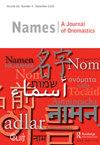Practicing and Managing Foreign Toponyms in China: Cultural Politics and Ideologies
IF 0.6
3区 文学
0 LANGUAGE & LINGUISTICS
引用次数: 0
Abstract
This study examines the vogue of adopting foreign-origin place names in Chinese cities and the Chinese governments’ endeavors to regulate the toponymic landscape. The place naming practices, management, and public attitudes concerning foreign toponyms are analyzed to reveal the cultural politics and ideologies of place naming in China’s context. It is found that the foreign toponyms emplaced in urban space mostly have Western origins or roots, and their profusion is largely attributed to their associated symbolic capital, and the clientele’s taste and class identity. In the rectification process, Chinese governments at different levels constructed themselves as protectors of traditional Chinese culture and guards against xenophilia, thus enhancing their symbolic power and governing legitimacy. The general public has resisted top-down toponymic planning via acts of citizenship to reclaim the rights of naming and owning public space. Our findings suggest that nowadays, even in highly regulated societies like China, it would be hard to achieve the expected planning goals when governments simply resort to hegemonic power to implement the place (re)naming policies.外国地名在中国的实践与管理:文化政治与意识形态
本研究考察了中国城市采用外国地名的流行趋势,以及中国政府在规范地名格局方面的努力。通过分析地名的命名实践、管理和公众对外来地名的态度,揭示中国语境下地名的文化政治和意识形态。研究发现,安置在城市空间中的外来地名大多具有西方的渊源或根源,其丰富程度很大程度上归因于与之相关的象征资本,以及客户的品味和阶级认同。在整风过程中,中国各级政府将自身构建为中国传统文化的保护者,防范排外主义,从而增强了政府的象征权力和执政合法性。公众通过公民行为抵制自上而下的地名规划,以收回命名和拥有公共空间的权利。我们的研究结果表明,如今,即使在像中国这样高度监管的社会,如果政府单纯地诉诸霸权来实施地名(重新)命名政策,也很难实现预期的规划目标。
本文章由计算机程序翻译,如有差异,请以英文原文为准。
求助全文
约1分钟内获得全文
求助全文
来源期刊

Names-A Journal of Onomastics
Multiple-
CiteScore
1.30
自引率
50.00%
发文量
23
期刊介绍:
Names, the journal of the American Name Society, is one of the world"s leading journals in the study of onomastics. Since the first issue in 1952, this quarterly journal has published hundreds of articles, reviews, and notes, seeking to find out what really is in a name, and to investigate cultural insights, settlement history, and linguistic characteristics revealed in names. Individuals subscribing to Names automatically become members of the American Name Society and receive the journal as part of their membership.
 求助内容:
求助内容: 应助结果提醒方式:
应助结果提醒方式:


